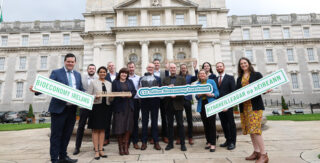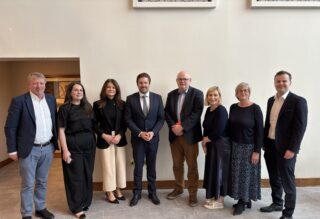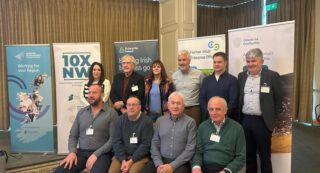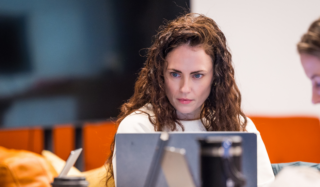An abalone aquaculture farm in Co. Galway is one of over 100 ocean farming and marine businesses across Europe joining forces with Trinity researchers and the Western Development Commission (WDC) on an international study investigating the challenges and benefits of a nature-positive economy.
The pilot study of the nature-positive potential of the blue economy in Ireland forms part of the GoNaturePositive! research project which is being launched by Malcolm Noonan, Minister of State for Nature, Heritage and Electoral Reform, at an event in Trinity Business School today, March 6th.
The Horizon Europe-funded initiative led by Trinity Business School involves 20 partners across 14 countries and a network of global collaborators to accelerate awareness and transformative action towards a nature-positive economy among policymakers, investors, businesses and wider society. Research will result in more clarity on the concept of a nature-positive economy and provide guidance for businesses and policy makers on the priorities for transformation. The project’s alignment with the WDC’s interests in marine and economic sustainability highlights a forward-looking approach to regional development, focusing on harmony between economic activities and nature.
Minister Noonan said: “I am delighted to launch GoNaturePositive! here in Trinity today. This EU award shows that Irish researchers are at the forefront of transformative change towards a more sustainable nature-positive economy. The outcomes from this research will help to inform government policy and provide guidance on the delivery of our new Irish National Biodiversity Action Plan. The Irish government recognises that we need to radically change the way in which we value nature. The ringfencing of €3,15 billion for climate and nature spending between 2026 and 2030 demonstrates our commitment to a nature-positive transition.”
Allan Mulrooney CEO of the Western Development Commission, which is partnering on the GoNaturePositive! project commented:
The blue economy is a key priority for the Western Region of Ireland, reflecting our dedication to exploring sustainable development within this sector. We are keen to engage with businesses of varying sizes to navigate this evolving landscape together. Recent research highlights the potential benefits of directing more investment towards environmentally conscious initiatives, like ocean farming. While this presents an exciting opportunity, it also allows us to consider how such strategies could foster economic vitality and environmental well-being across our region, benefiting a broad spectrum of stakeholders.

At the heart of the project are six pilot studies of nature-based enterprises – ocean farming and marine businesses in Ireland; bee-farming in Colombia; regenerative farming in Belgium; carbon-neutral forestry and nature-positive tourism in Italy and green building enterprises throughout Europe. These pilots showcase real-world challenges and opportunities and demonstrate the measurable contribution of project interventions.
Engagement in initiatives like GoNaturePositive! reflects the Western Development Commission’s supportive role in fostering an environment where sustainable practices are encouraged, contributing to a vision of balanced growth in the Western Region. The initiative underscores a shared commitment to exploring sustainable opportunities that reflect the unique potential of the Western Region.
Siobhan McQuaid, Principal Investigator on the GoNaturePositive!, added: “There is no doubt that the restoration of nature presents enormous economic opportunities. But how we set out to define and action the idea of a nature-positive economy is less clear. And what does a nature positive economy mean on the ground for people, businesses, and farmers? The ambition of GoNaturePositive! is huge – to lead to a paradigm shift in economic thinking and practise away from the current spiral of planetary degradation and towards the new opportunities proposed by a nature-positive economy.”
Cindy O’Brien, marine biologist and owner of Abalone Chonamara Teoranta, is one of the Irish nature-positive aquaculture business participating in the Irish pilot. “We are delighted to participate in this research. While there is much scientific evidence about the benefits of abalone, seaweed and other forms of mariculture for storing carbon, much less research is looking at new opportunities for growth and scaling. There is huge potential for seaweed to be integrated into biodegradable materials for the bioeconomy for example, as well as for food and biopharmaceutical ingredients. We need to start cultivating these raw materials and we urgently need more research and financing to support the growth of these types of climate-resilient, nature-positive businesses.”
Sinead O’Brien, Cindy’s daughter and founder of neighbouring business Mungo Murphy’s Seaweed Co, added: “I look forward to seeing how the GoNaturePositive! initiative can help inform policy to improve the bureaucratic and investment landscape for this sector, as these are major hurdles to the scaling up of small businesses like ours.”
At today’s event in Trinity Business School business and environmental leaders from around the world will gather to begin the process of shaping an inclusive EU definition of the nature positive economy and to kickstart discussions on how such a definition can be integrated into future EU, national and local government policies, and programmes within the framework of the broader EU Green Deal.





